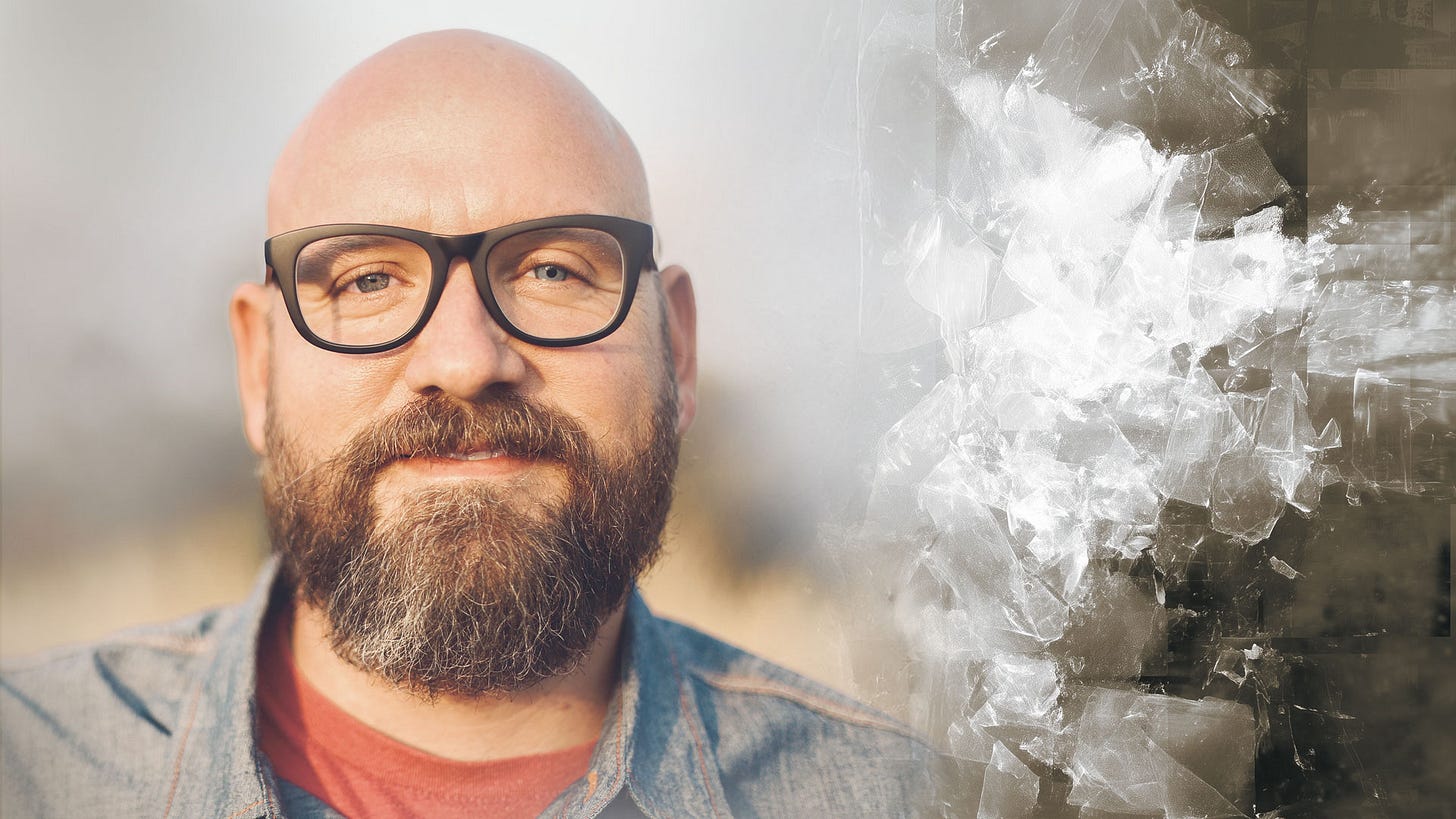The First Step Is the Hardest
Why most people stay stuck, and how to build confidence through motion—not mastery.
We talk a lot about doing the work. Shipping. Building. Launching. But rarely do we talk about the part just before that—the space where most people get stuck.
It’s not laziness. It’s not ignorance. It’s not a lack of ambition. It’s something quieter. More invisible. It’s the subtle tension between what we say we want to do and the fear of doing it poorly, visibly, for the first time.
For some, that fear shows up as procrastination. For others, it’s research addiction. We stall out in the margins, waiting for clarity, credentials, or “just one more piece of the puzzle.” We buy books (or in my case, art supplies — ALL of them). We redesign logos. We imagine what it would be like to start the thing, pitch the client, ask for the sale. But imagination doesn’t move the needle. Action does. And action is terrifying when you've never seen it modeled up close.
That’s the real curse of the first-time founder. It’s not just that you don’t know what to do—it’s that no one ever taught you how to move forward without certainty. We treat execution like it’s reserved for the chosen few: the naturally confident, the well-connected, the ones with startup pedigrees. The rest of us wait. And wait. And wait. Hoping someone will show us how.
But what if no one’s coming? What if the only way to find your way forward is to take the first step before you're ready?
Josh Little knows that space well. A perpetual starter, he began life as a schoolteacher (unless you count the years he spent slinging Cheddar Bay Biscuits!), then taught himself to sell. He worked for three Fortune 500s, then left to build his own company—without funding, a tech background, or a roadmap. That first leap led to six startups, five exits, one comeback, and more than a few grand experiments along the way, including a boutique pickle brand. What ties it all together isn’t success—it’s movement. A willingness to try. Again and again.
From Classroom to Boardroom: Meet Josh Little
Josh Little didn’t come from tech. He came from a classroom.
After starting his career as a high school teacher, Josh moved into sales—and discovered he was good at it. Really good. That skill led him through roles at three Fortune 500 companies before he decided to make a leap of his own. With no technical background, no Silicon Valley connections, and no roadmap, he bootstrapped his first startup, Maestro, into a profitable e-learning business serving major clients in pharma and medtech.
That success led to more. He went on to build Bloomfire (acquired), Quizzer (acquired, 200M users!), and Volley—a video-first messaging app created to reduce meeting fatigue and improve communication for remote teams. Along the way, he’s faced burnout, battled back, and even now is flirting with “officially” launching a pickle empire based on his family’s five-generation-old recipes. (Yes, really. Buy some!)
Today, he splits his time between growing his latest companies, coaching emerging founders, and experimenting with what he calls "creative leverage"—the edge you get from being brave enough to try.
Execution Over Expertise
Josh didn’t get where he is by having all the answers. He got there by taking action before he felt ready—and learning fast. Here are a few insights from our conversation with Josh, each paired with a practical takeaway you can use to start making real progress today.
“Be brave enough to try.”
“It’s written into our family trust. It’s on the wall of our home. That mindset of ‘We’ll figure it out’—that’s the whole game.”
Actionable Insight:
You don’t need certainty to start—you need momentum. Instead of planning for every possible outcome, commit to learning as you go. The confidence comes after the leap.
“I had notebooks full of ideas. But none of it mattered until I finally jumped.”
“I was the guy hijacking dinner conversations with startup pitches. I had hundreds of ideas. But nothing changed until I went all in.”
Actionable Insight:
Thinking and talking won’t build anything. If you’ve been circling an idea for years, pick one and commit. Even failure teaches more than over-analysis ever will.
“Other people do this every day—so why not me?”
“It’s just nuts and bolts. If other people can do this, I can too.”
Actionable Insight:
Next time you’re intimidated by something new, remind yourself that it’s not magic—it’s muscle memory. Find someone who’s done it, study what they did, and start turning the wrench.
“Side hustles are a joke.”
“I tried to build Maestro on the side. It didn’t work. The only thing that worked was going all in.”
Actionable Insight:
If something matters, it deserves your full weight. Carving out an hour on weekends won’t replace the transformation that comes from total commitment.
“I don’t make many decisions based on fear.”
“I grew up with people who did. And I saw what that created—safe, small lives. I wanted something different.”
Actionable Insight:
Scan your current situation. What decisions are you avoiding because of fear? What would your life look like if you moved toward that fear instead of away from it?
“You don’t have to be technical to build something great.”
“I tried learning to code. But I realized I didn’t need to be a technical mastermind—I needed to be the guy who cast the vision and built the team.”
Actionable Insight:
Play to your strengths. You don’t need to do it all yourself. You need to lead with conviction and recruit the right people to do what you can’t.
“Most people don’t apply what they learn.”
“I read Atomic Habits—and I started doing push-ups. A lot of people read it and didn’t change a thing. That’s the difference.”
Actionable Insight:
When you finish your next book, don’t just highlight a quote. Do one thing from it. Real learning lives in application, not absorption.
Nothing Changes If You Don’t Move
It’s easy to assume the people building great companies have something you don’t—more knowledge, more time, more resources, more clarity. But most of the time, they just started. They made the call, sent the invoice, booked the domain. Not because they were fearless, but because they understood that clarity comes after motion.
Josh Little isn’t successful because he always knew what he was doing. He’s successful because he built muscle where most people flinch—showing up, trying again, and pushing through the discomfort of doing things he’d never done. If you're waiting for permission, a mentor, a plan—this is it. Now, take the next step.
Thanks for reading,
—Ryan
Ready for more?
Catch Josh Little’s interview in its entirety on Eggs! The Podcast.
Don’t miss a show! Subscribe on Spotify, Apple Podcasts, or really anywhere great podcasts are found.
Path Picks
Cool stuff to help you forge your path to greatness.
Note: The Path Weekly is reader-supported. As such, I may be using affiliate links below. If you want to support the newsletter at no additional cost to you, please consider using the links below. If you’d rather not, most items below are widely available anywhere you want to shop. Thanks! –R
Reading list
If you're looking to dive deeper into the ideas discussed in this piece, here are some recommended books and resources that align with Kyle McDowell's principles:
Rich Dad Poor Dad by Robert Kiyosaki
The book that flipped Josh’s mindset and made entrepreneurship feel possible. A foundational text on financial independence, asset-building, and rethinking the 9-to-5 path.Atomic Habits by James Clear
A playbook for changing behavior through small, consistent improvements. Josh doesn’t just read this book—he applied it, starting a habit of daily push-ups that stuck.Can’t Hurt Me by David Goggins
Part memoir, part mental toughness manifesto. Goggins’ story of transforming pain into power inspired Josh to start running again for the first time since high school.Born to Run by Christopher McDougall
A captivating story about endurance, human potential, and the power of movement. Josh picked this up alongside Can’t Hurt Me as part of his personal push to test limits—physical and otherwise.Shut Up and Run by Robin Arzon
Part motivation, part movement philosophy. This book reframes running not as punishment, but as freedom—a theme that resonates with anyone pushing through discomfort.
More to explore
Josh Little Websites:
Pickles!: https://joshspickles.com
Coaching: https://calendly.com/joshlittle/coaching
MendU.ai: https://www.mendu.ai
Volley App: https://www.volleyapp.com/
LinkedIn: https://www.linkedin.com/in/littlejosh/
Work with me
Ryan Roghaar - Fractional CMO/Creative Director/Art Director: https://rogha.ar/portfolio
R2 - Creative Services for Agencies and SMBs: https://www.r2mg.com
Eggs! The Podcast: https://www.eggscast.com
Would you like a personal introduction to any of the incredible leaders featured in The Path Weekly to explore business or other collaborative opportunities?
Contact me here to learn more about my B2B matchmaking service.
Get featured
Do you want to be featured in a future edition of The Path Weekly?
Contact me to learn more.




